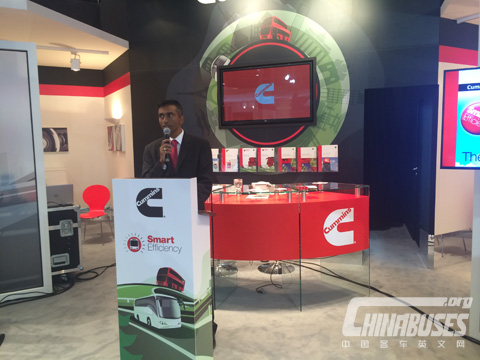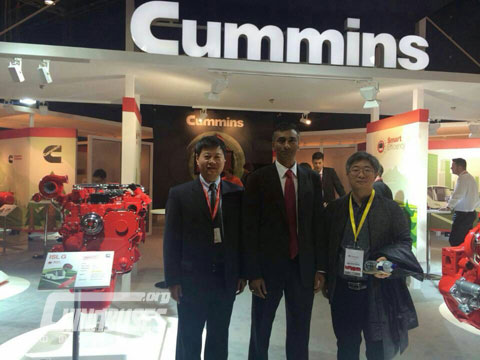Kartik Ramanan, GM of Global Bus Business of Cummins Inc. Interviewed by www.chinabuses.org
2015-10-26 Source:www.chinabuses.org
Summarize:Kortrijk, Belgium (October 16, 2015) – Visitors to Busworld at the Kortrijk Expo were able to view the latest Cummins ISB engines with new SmartEfficiency ratings for 2017,. Displayed on stand 407. First conventional bus stop-start system launched by Cummins Europe claiming 4-7% fuel saving. Chinabuses.org interviewed Mr.Kartik Ramanan, GM of Global Bus Business of Cummins Inc. after the press conference.
www.chinabuses.org: Kortrijk, Belgium (October 16, 2015) – Visitors to Busworld at the Kortrijk Expo were able to view the latest Cummins ISB engines with new SmartEfficiency ratings for 2017,. Displayed on stand 407. First conventional bus stop-start system launched by Cummins Europe claiming 4-7% fuel saving. Chinabuses.org interviewed Mr.Kartik Ramanan, GM of Global Bus Business of Cummins Inc. after the press conference.

Kartik Ramanan, GM of Global Bus Business of Cummins Inc.
Ms. Zhang: Thank you for your taking our interview! And first could you please introduce your new products to our readers?
Mr. Ramanan: The new product you see is involving Stop-start technology. So traditionally, we had Stop-start technology in hybrid buses. The issue with hybrid buses is a great technology, it's just upfront investments, and (it) relies on subsidies from government. What we've decided in Cummins is that (or) our philology is the technology should be sustainable. We are (not only) talking about environmental sustainability, but it also needs to have financial sustainability. So we adopt environmental sustainability and financial sustainability that can be accomplished by sharp feedback community. That's why we decided we should have to adopt for conventional diesel buses. And the technology we have scored 4-7% fuel economy. And also reduce exhaust (by) 30% to 40%, which is a significant emission reduction when you compare it to other applications and other buses. And also noise reduction. So overall passenger comforts, there is emission reduction, and also the owner, or the operator can have a significant return on investment. Hybrid technology. So our focus is to deliver very strong diesel (buses) to our end users or operators.
Ms. Zhang: How could introduce your new products to Chinese market?
Mr. Ramanan: I think there is school to use the technology to the China market. It has to be closer working with OEM partners we have and the end users. I think the first step is to educate the end users. There is a lot of knowledge on the electrification side now, a lot of knowledge on the hybrid side, natural gas. These are very valuable technologies. This could change the view to look at the conventional fuel, the diesel engines. A lot technology accomplish even with the natural gas engines. We do that easy natural gas. We do have, the technology available. The way we have preceded, in this particular case, is we use this technology in Europe. Very soon we will be looking at how we can do it on a global basis. China is an extremely important market which we definitely will look at.
Ms. Zhang: What is your expectation to China bus market?
Mr. Ramanan: China market is the biggest in the world. So I think it is an extremely important market. What makes the market even more important or special is the fact that not only it is the biggest market, but they are experimenting the new technologies. You have technologies, such as electric bus. See China is the biggest electric bus manufacturer in the world. (And also) hybrid technologies, natural gas hybrid> I think there is a lot of technological advances being made in China. Big market, important market, a market that is ready to take new technologies, a market that is willing to experiment and willing to invest in new technologies. That's the kind of market we would love because it helps us deliver a lot of technological advances that we have made.
Ms. Zhang: How do you think the Cummins' advantages in the new energy area?
Mr. Ramanan: So Cummins has a different take on new energy. What we believe is new energy vehicle, they are there. It is just that we see and our philosophy is environmental and financial sustainability. We mean that our focus is on technology feedback from customers. Imagine (there is) no incentives (and) no subsidies, how can we make the technology attractive to the end users without subsidies? That's been our overall focus. So we will continue to work in that direction, (making our technologies) independent or less dependent on subsidies. That will be our area of focus. We recognize there are electric buses (and) hybrid buses. We will continue to look at how we can play in that arena. The immediate future is how we can change the definition of conventional buses so that they are more and more sustainable. Both environmentally they should be cleaner (and) how we can do it sustainably in a financial sense, the issue of costs. We will continue to develop our technologies. You know, We have given development plan and we will execute it in the next few years.
Ms. Zhang: Thanks for your contribution to the development of the global industry.Thank your very much for your time.
Mr. Ramanan: Thank you!

Liu Yue,General Manager-Natural Gas Asia & China Bus Market, Kartik Ramanan
and Wu Yongqiang, Chief Editor of www.chinabuses.org
About Cummins
Cummins, a global power leader, is a corporation of complementary business units thatdesign, manufacture, distribute and service diesel and natural gas engines and relatedtechnologies, including fuel systems, controls, air handling, filtration, emission solutionsand electrical power generation systems.
Headquartered in Columbus, Indiana, (USA) Cummins currently employs approximately 54,600 people worldwide and serves customers in approximately 190 countries and territories through a network of approximately 600 company-owned andindependent distributor locations and approximately 7,200 dealer locations. Cummins earned $1.65 billion on sales of $19.2 billion in 2014. More information can be found on www.cumminsengines.com.
Views:0Editor:
Related China Bus News
